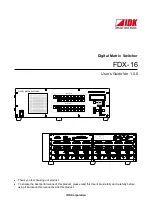
Installing the Device
2.1 General Procedure
of a tool, lock and key, or other means of security, and controlled by the authority
responsible for the location.
2.1
General Procedure
The general procedure for installing the device is as follows:
Note
The user is responsible for the operating environment of the device, including
maintaining the integrity of all protective conductor connections and checking
equipment ratings. Make sure to review all operating and installation instructions
before commissioning or performing maintenance on the device.
1. Review the relevant certification information for any regulatory requirements.
For more information, refer to
.
2. Mount the device.
3. Connect the failsafe alarm relay.
4. Connect power to the device and ground the device to safety Earth.
5. Connect the device to the network.
6. Configure the device.
2.2
Unpacking the Device
When unpacking the device, do the following:
1. Inspect the package for damage before opening it.
2. Visually inspect each item in the package for any physical damage.
3. Verify all items are included.
Note
If any item is missing or damaged, contact Siemens for assistance.
2.3
Installing the Device in Hazardous Locations
The RUGGEDCOM RS930L is designed to comply with the safety standards for Class I,
Division 2 hazardous locations where concentrations of flammable gases, vapors or
liquids may be present, as opposed to normal operating environments.
Note
The device is certified for installation in hazardous environments as a component
only. It is required to be installed in a suitable enclosure where the final combination
is subject to acceptance by an authorized local inspection authority.
6
RUGGEDCOM RS930L
Installation Manual, 04/2021, C79000-G8976-1034-09
















































